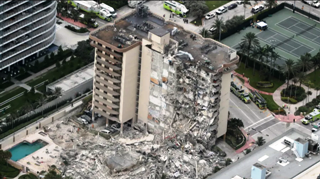|
By
Tampa Bay Times Editorial Board
Published May 8, 2022
|
|
Florida lawmakers wasted a golden opportunity during the
recent legislative session to respond to last year’s deadly condominium
collapse in Surfside. And the impacts are already being felt, as insurers
unwilling to write policies on aging condominiums continue to leave the
market. This upheaval is bad news for condo owners and taxpayers alike, and
lawmakers should move quickly to restore confidence in these buildings and
this industry.
|
A federally appointed
team of engineering experts is investigating what caused the
12-story Champlain Towers South condominium in Surfside,
north of Miami Beach, to collapse in June, killing 98
people. While understanding the science behind the tragedy
is critical, the collapse also exposed dangerous gaps in how
condominiums in Florida are managed and maintained. Only two
Florida counties — Miami-Dade and Broward — require that
condos be inspected and recertified as safe after a building
turns 40. That requirement needs to be toughened and applied
statewide.
Legislation that initially sailed through the House and
Senate during the recent legislative session would have
helped. HB 7069 required a mandatory inspection for
multifamily residential buildings three stories or higher
once they reached 30 years old (or within 25 years if within
three miles of the coast) and re-inspections every 10 years
thereafter. The move would have given condo owners a fuller
picture of their building’s structural integrity, while
helping condo associations better plan for costly, long-term
maintenance. But a late-session amendment by the Senate
removed the requirements for condominiums to hold money in
reserve for repairs, a change the House sponsor declared
unacceptable, killing the legislation in March. |
|
Part of the 12-story oceanfront Champlain Towers
South Condo in Surfside collapsed on June 24, killing 98 people.
|
Legislative leaders bungled what should have been a
bipartisan priority. Even a compromise that phased-in more money for repairs
would have been a reasonable place to start. Florida has more than 1.5
million residential condos, and of those, nearly 600,000 are at least 40
years old, with an estimated 2 million people living in condos 30 years or
older. Another 142,000 units in the state are 20 to 30 years old. Residents
need to know what physical shape these buildings are in, and the costs
required to maintain them. That’s doubly obvious as rising seas and other
climate-related impacts threaten this Florida way of life.
The Legislature’s failure to act on condo safety is increasingly hurting the
market. As the Miami Herald reports, insurance companies are on the retreat,
fearing the unknown of potential losses, leaving condo associations to deal
with carriers in the lesser-regulated surplus market. The uncertainty has
translated to massive price hikes and carve-outs for policyholders. As the
Herald reports, associations are having a hard time getting their
pre-Surfside policies renewed, forced instead to consider less protective
plans that cost twice as much, or higher. Many of those lucky enough to
renew are facing premium increases of 30% to 50%. Carriers are picking and
choosing which buildings to insure. With prices rising and competition
shrinking, owners face higher costs while an unsettled market faces greater
uncertainty.
The driving force for these changes is to protect more lives. But
condominiums also serve as vacation and second homes, and protecting the
value of these properties, which litter the Florida coast, is critical to
the tax base of the state. Lawmakers will gather for a special session in
May to confront a separate problem with homeowners’ insurance. While that
agenda looks too narrowly focused to include condominium reforms, lawmakers
need to fashion a post-Surfside package soon. This crisis has too many
ramifications to leave it to insurers and lenders alone to resolve. Turning
a blind eye to condo safety got us here, and it’s not a winning strategy to
continue.
|
